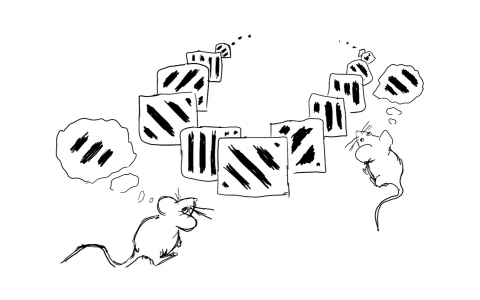
11 memory tips from leading neuroscientists
By April Cashin-Garbutt and Hyewon Kim
Unlike a camera or dashcam, our memory is thought to be fluid. Rather than faithfully recalling every sound, sight, touch, or smell, our memory can even change each time we retrieve it, reflecting the dynamic nature of connections in the brain.
Many of us wish we had better memories. And so, we asked leading neuroscientists who visited SWC to share their favourite memory tips. Here’s what they had to say.
1. Create a unique marker
“Creating a unique marker can help. For example, a technique that a colleague of mine came up with to remember whether or he has locked the door of his house is to name a different famous football player as he does this. Part of the problem with remembering if you’ve locked the door is that we cannot disambiguate the memory of doing it today from all the other times we’ve done the same thing in the past. So, having that individual marker can help you remember.” Mark Walton, University of Oxford
2. Manage your stress levels
“So much of the problem of remembering things in life has to do with how stressed out one is. Stress is bad for memory. Humans have probably always had stressful times over the course of their life. But these days we seem to be setting records in that area, especially young folks. One solution is meditation, which, among other things, helps regulate the autonomic nervous system and the endocrine system. The problem is it is hardest to do when you need it the most! But I’ve found that even if you’re not a seasoned meditator, and I certainly am not, a little breathing and relaxation can really help. There’s no shortage of free apps.” Joseph LeDoux, New York University
3. Get a good night’s sleep!
“Sleep! I've done a lot of training in medical school and residency where I crammed for exams, and even a one-hour nap was game changer. I learned the hard way that you’re always behind in these environments, and a nap was key to effective cramming. Sleep just clears up noisy ideas in a miraculous way.” Karunesh Ganguly, UCSF and the San Francisco VA Medical Center
“Sleep. A simple yet very effective brain hack. Science has told us for decades that even when we are resting, our brains aren’t. During sleep, our brains are working to encode new information, sorting through recent experiences, and storing them for later use. Interestingly enough, a recent study also tells us that giving computational algorithms a sleep-like break may also help them learn new things and “remember” old ones. From a personal perspective, I’ve had to train myself to sleep. I often have spurts of intense work with late nights of thinking, coding, and writing. My younger self was all about sprinting, and with sprinting came intense periods of burnout that could only be fixed by intense periods of sleep. Now, I purposefully and regularly sleep more than I ever thought I needed. It’s helped me become a marathoner of science and life, instead of a sprinter.” Kanaka Rajan, Harvard University
“Basically, sleep! You’re not being lazy when you sleep. Your brain is working hard – do it more! I think society has for a long time imparted messages like, ‘You can sleep when you’re dead, there is work to do.’ But I think sleep is incredibly important for mental health, general day-to-day mood and cognition, being smarter the next day. So if you want to be productive, don’t deprive yourself of sleep. Enjoy the fact that sleep is good for you, do it more, don’t feel guilty about it. Lie in.” Julia Harris, The Francis Crick Institute and SWC
4. Actively engage in the memory storage process
“My main memory tip is get enough sleep! But memory also depends critically on attention. I am unbelievably bad at remembering people’s names and even if I attend to them, I am still bad at remembering them because they are arbitrary. But we all know that some people, such as politicians, are good at remembering names and there are specific ways of doing it. A lot of this is about being conscious of what is really important to store and being actively engaged in the storage process.
What I often do with people in my lab that are working on different projects is at the end of the meeting I repeat back to them a summary of everything that we just talked about. This helps me to reinforce and consolidate our conversation so I am much more likely to remember it the next time we meet and I can pick up from where we left off.” Loren Frank, UCSF
5. Keep a notebook
“My memory is really bad – I’m one of those people that has especially bad episodic memory. My main memory tip is to keep a notebook. I have one in my back pocket almost all the time, and whenever I really need to remember something, I write it down. And even the act of writing itself helps me remember. When I was in undergrad, I would make notecards to study because the act of making the notecards was more helpful than even flashing them to quiz myself!” Andrew Alexander, University of California Santa Barbara
6. Organise your digital storage
“I personally don’t have a good memory. I tend to rely on “external storage,” a bit like a hard drive versus memory in computers. My strategy to overcome the issue of not remembering things well is to have a very organised system so that you store information somewhere you can retrieve that information later on.” Weizhe Hong, UCLA
7. Repeat and reactivate
“When you first meet someone, it is essential that you repeat their name – I find I am much more likely to remember it that way!” Andrew King, University of Oxford
“I definitely believe that reactivating a memory strengthens it." Ilana Witten, Princeton University
8. Use multiple senses
“Somebody told me in medical school that the best way to remember things is to observe the same object or whatever you want to remember with many different sensory systems. So if I see something, and I also smell and touch it, for example, I would remember it more. This kind of multisensory representation really works for me. The more angles with which I look a problem, the more I remember it.” Botond Roska, Institute of Molecular and Clinical Ophthalmology, Basel
9. Have a story in mind
“Having a story really helps you remember. Our brains don’t really like to remember facts. We like to remember stories. If it fits a narrative or story we tell ourselves, it’s easier to remember. For example, when you’re reading a paper, I don’t necessarily remember all pieces of data. Doing so could actually be really adaptive as you can reinterpret the data. But it’s easier to remember what this person found and how that fits into your broad worldview of science. If the goal is to remember better, you need to fit it into a narrative.” Megha Sehgal, University of California, Los Angeles
10. Remember what interests you
“In science, I found the best way to proceed is to maintain a working model in your head and update it continuously, whenever you listen to a new talk or read a new paper. You should be open, but always keep updating your own model. Keep notes on the side and keep updating your own model – this way, you can also selectively remember what interests you. In a way, you updated your thinking online. Then, if it requires more thought, you can go home and see whether your overall understanding is still consistent. Of course, your model might be wrong and in that case you might lose important information that you screened out. But this is your model and this is your risk. This is my non-sophisticated brain hack.” Ehud Ahissar, Weizmann Institute of Science
“The idea is that there are different memory systems in the brain for different memorizing purposes, for example, the hippocampus and the basal ganglia, or cerebellum. There is the memorisation of facts – for example, the last time in London I remember being at UCL and the location of the restaurant I was in. Those are facts: time, location, and the people I met with. There is then another type of memory, called motor memory, or procedural memory – the know-how. If you like skiing, you never forget how to ski as long as you learn it the first time. The first time was probably difficult, but as long as you learn it the first time, even after three years of never going to a mountain, you can pick it up again within a few seconds and be good again or even better. That is very different from you recognising an old friend in your hometown. If you don’t see a mid-school classmate for a long time, you may forget their name.
This shows how there are different types of memory systems operating in the brain. For me, I was gifted more with factual memory. If I read a paper, many years later I know exactly which year, who published it and in which journal. I can remember O’Keefe’s paper from 1971 at Brain Research, which won him the Nobel Prize and had only one figure. I can remember that, even if I haven’t read it for almost 20 years since graduate school. But I am not very good at learning skills. It took me quite a long time to learn how to ski. It’s quite interesting. The interaction between different memory systems in the brain is a fascinating topic. Sometimes they help each other and sometimes they compete. For me, I didn’t necessarily want this but I seem better at fact memory than motor memory, that’s probably why I choose to study basal ganglia in my lab.” Xin Jin, East China Normal University
11. Train your brain!
“Memory is a trainable skill. Our brains are more plastic when we are younger but we can still improve our memory as adults. There are educational strategies you can use to help improve your memory.” Zeynep Okray and Pedro Jacob, University of Oxford


